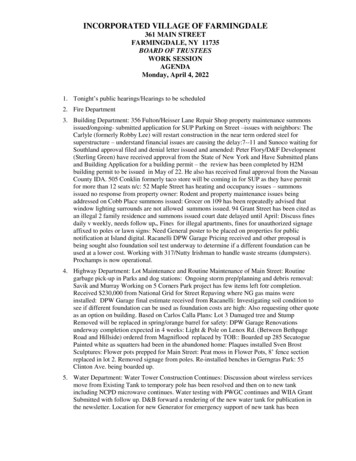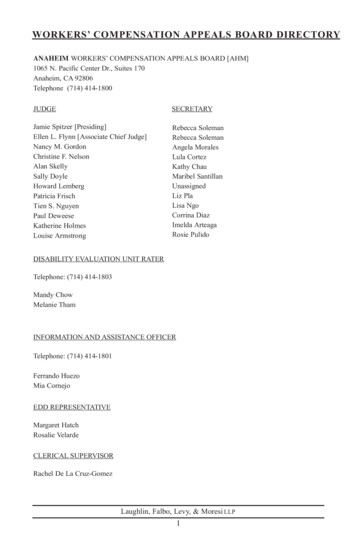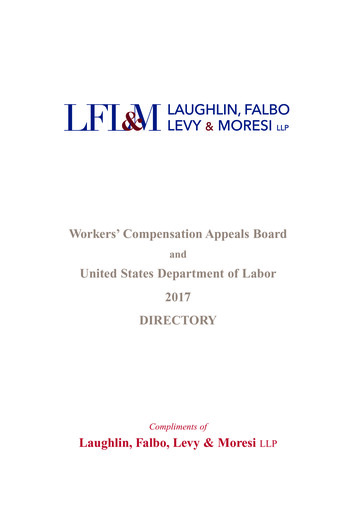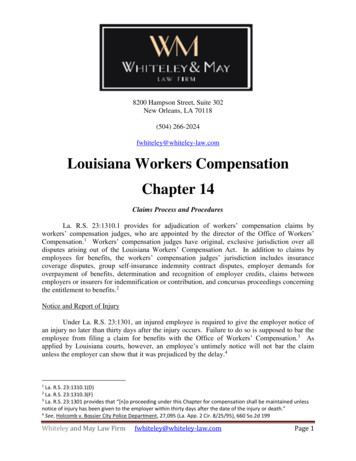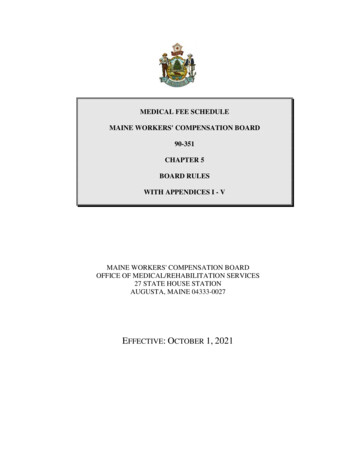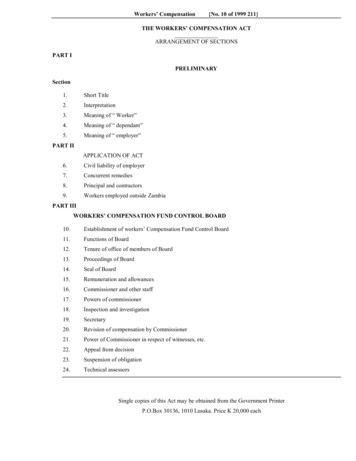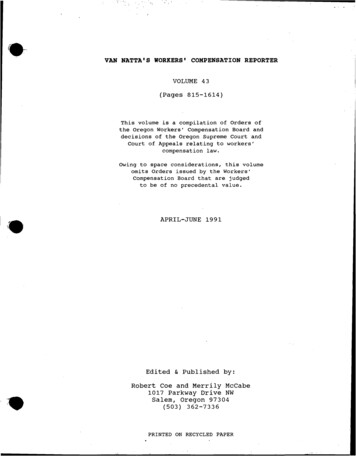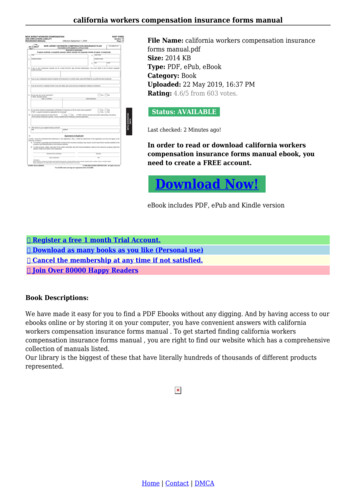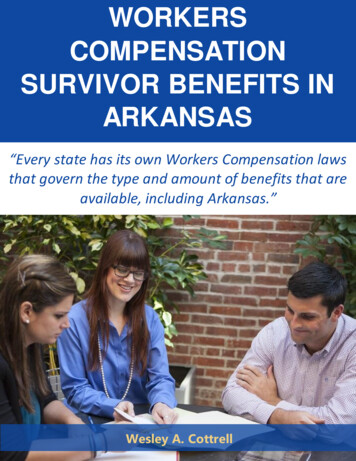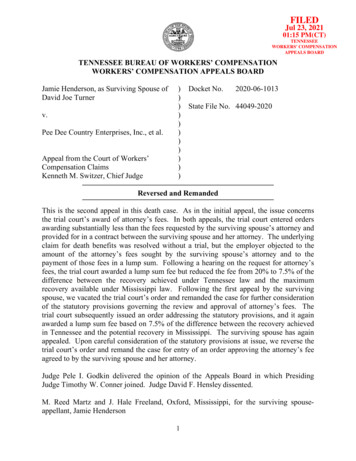
Transcription
FILEDJul 23, 202101:15 PM(CT)TENNESSEEWORKERS' COMPENSATIONAPPEALS BOARDTENNESSEE BUREAU OF WORKERS’ COMPENSATIONWORKERS’ COMPENSATION APPEALS BOARDJamie Henderson, as Surviving Spouse ofDavid Joe Turnerv.Pee Dee Country Enterprises, Inc., et al.Appeal from the Court of Workers’Compensation ClaimsKenneth M. Switzer, Chief Judge)))))))))))Docket No.2020-06-1013State File No. 44049-2020Reversed and RemandedThis is the second appeal in this death case. As in the initial appeal, the issue concernsthe trial court’s award of attorney’s fees. In both appeals, the trial court entered ordersawarding substantially less than the fees requested by the surviving spouse’s attorney andprovided for in a contract between the surviving spouse and her attorney. The underlyingclaim for death benefits was resolved without a trial, but the employer objected to theamount of the attorney’s fees sought by the surviving spouse’s attorney and to thepayment of those fees in a lump sum. Following a hearing on the request for attorney’sfees, the trial court awarded a lump sum fee but reduced the fee from 20% to 7.5% of thedifference between the recovery achieved under Tennessee law and the maximumrecovery available under Mississippi law. Following the first appeal by the survivingspouse, we vacated the trial court’s order and remanded the case for further considerationof the statutory provisions governing the review and approval of attorney’s fees. Thetrial court subsequently issued an order addressing the statutory provisions, and it againawarded a lump sum fee based on 7.5% of the difference between the recovery achievedin Tennessee and the potential recovery in Mississippi. The surviving spouse has againappealed. Upon careful consideration of the statutory provisions at issue, we reverse thetrial court’s order and remand the case for entry of an order approving the attorney’s feeagreed to by the surviving spouse and her attorney.Judge Pele I. Godkin delivered the opinion of the Appeals Board in which PresidingJudge Timothy W. Conner joined. Judge David F. Hensley dissented.M. Reed Martz and J. Hale Freeland, Oxford, Mississippi, for the surviving spouseappellant, Jamie Henderson1
Lee Anne Murray and Taylor R. Pruitt, Brentwood, Tennessee, for the employerappellee, Pee Dee Country Enterprises, Inc.Factual and Procedural BackgroundThis is the second appeal in this case concerning a dispute over attorney’s fees.The factual and procedural background of the case was summarized in our earlier opinionas follows:On September 18, 2019 (or soon after midnight on September 19),while traveling in California in the course and scope of his employmentwith Pee Dee Country Enterprises, Inc. (“Employer”), David Joe Turner(“Employee”) was tragically killed in a motor vehicle accident. Employermaintained its business in Davidson County, Tennessee, while Employeeand his wife, Jamie Henderson (“Surviving Spouse”) lived in LafayetteCounty, Mississippi. The claim was accepted as compensable byEmployer, and its insurer began paying death benefits under the laws of theState of Mississippi soon after Employee’s death.In December 2019, Surviving Spouse retained her current counsel,who advised her to pursue death benefits under Tennessee law instead ofMississippi law. In January 2020, Surviving Spouse advised Employer ofher intent to pursue death benefits in Tennessee. Employer, through itsinsurer, promptly agreed to pay death benefits pursuant to Tennessee law.It is undisputed that Surviving Spouse had agreed to pay her attorneystwenty percent of the difference between the maximum amount of deathbenefits payable under Mississippi law ( 199,714.50) and the maximumamount payable under Tennessee law ( 432,000.00). Twenty percent ofthe difference of 232,285.50 would equal 46,457.10.Although the underlying claim for death benefits was resolved, theparties could not resolve the issue of attorneys’ fees. Employer declined topay the attorneys’ fee in a lump sum and objected to the extent of the fee.On September 16, 2020, the trial court entered an order requiring SurvivingSpouse’s counsel to supplement his affidavit in support of the request forapproval of the attorneys’ fees with information documenting the actualtime and labor required for his firm’s representation of Surviving Spouse.Surviving Spouse’s counsel filed this supplemental information as orderedbut argued “the appropriate measurement is the reasonableness of thecontingency fee rather than the retrospective review of time and laborversus the work actually performed.”2
A hearing to approve the underlying settlement was conducted onOctober 9, 2020, and the underlying settlement was approved with theexception of the attorneys’ fee. Following a subsequent hearing to addressthe attorneys’ fee issue, the trial court issued an order granting an attorneys’fee but reducing the fee from twenty percent of the additional benefitamount to seven-and-one-half percent of the additional benefit amount.Henderson v. Pee Dee Country Enters., Inc., No. 2020-06-1013, 2021 TN Wrk. Comp.App. Bd. LEXIS 8, at *2-4 (Tenn. Workers’ Comp. App. Bd. Mar. 8, 2021) (footnoteomitted).In the first appeal, we concluded the trial court failed to address the applicabilityof certain statutory provisions governing the approval of attorney’s fees in workers’compensation cases, and we vacated the trial court’s order and remanded the case forfurther consideration in light of those provisions. The parties submitted additional briefsto the trial court, after which the court concluded that “the Court of Workers’Compensation Claims has sole jurisdiction and statutory authority to approve attorneys’fees,” and that judges of the Court of Workers’ Compensation Claims “must review therequested fee for reasonableness ‘as appropriate’ under Supreme Court Rule 8 and makerequired findings applying the factors within that rule.” The court reiterated its award of 17,421.41 in attorney’s fees, or 7.5% of the increase in Surviving Spouse’s recovery, tobe paid in a lump sum. Surviving Spouse has appealed the trial court’s order.Standard of ReviewThe standard we apply in reviewing a trial court’s decision presumes that thecourt’s factual findings are correct unless the preponderance of the evidence is otherwise.See Tenn. Code Ann. § 50-6-239(c)(7) (2020). The interpretation and application ofstatutes and regulations are questions of law that are reviewed de novo with nopresumption of correctness afforded the trial court’s conclusions. See Mansell v.Bridgestone Firestone N. Am. Tire, LLC, 417 S.W.3d 393, 399 (Tenn. 2013). We arealso mindful of our obligation to construe the workers’ compensation statutes “fairly,impartially, and in accordance with basic principles of statutory construction” and in away that does not favor either the employee or the employer. Tenn. Code Ann. § 50-6116 (2020).AnalysisOn appeal, Employee asserts the trial court erred in its interpretation andapplication of the second sentence of section 50-6-226(a)(1) and by awarding an“arbitrary attorney’s fee of only 7.5% of the increased benefits” available to Employeeunder Tennessee law. Conversely, Employer contends the trial court correctly held thesecond sentence of Tennessee Code Annotated section 50-6-226(a)(1) “does not apply to3
this case.” In addressing this issue, we must first interpret certain statutes in the workers’compensation law governing attorney’s fees. Specifically, we must determine whetherthe second sentence of Tennessee Code Annotated section 50-6-226(a)(1) (2019), whichmandates “[t]he department shall deem the attorney’s fee to be reasonable if the fee doesnot exceed twenty percent (20%) of the award to the injured worker,” applies to this case.For the reasons explained below, we conclude it does.The Tennessee Supreme Court has, on numerous occasions, addressed theprinciples of statutory construction:The primary goal of statutory interpretation is to carry out legislative intentwithout expanding or restricting the intended scope of the statute. Indetermining legislative intent, we first must look to the text of the statuteand give the words of the statute “their natural and ordinary meaning in thecontext in which they appear and in light of the statute’s general purpose.”When a statute’s language is clear and unambiguous, we enforce the statuteas written; we need not consider other sources of information. We applythe plain meaning of a statute’s words in normal and accepted usagewithout a forced interpretation. We do not alter or amend statutes orsubstitute our policy judgment for that of the Legislature.Coleman v. Olson, 551 S.W.3d 686, 694 (Tenn. 2018) (citations omitted). In addition,the Supreme Court has stated:In construing legislative enactments, we presume that every word in astatute has meaning and purpose and should be given full effect if theobvious intention of the General Assembly is not violated by doingso. . . . It is only when a statute is ambiguous that we may reference thebroader statutory scheme, the history of the legislation, or other sources.Further, the language of a statute cannot be considered in a vacuum, but“should be construed, if practicable, so that its component parts areconsistent and reasonable.” Any interpretation of the statute that “wouldrender one section of the act repugnant to another” should be avoided. Wealso must presume that the General Assembly was aware of any priorenactments at the time the legislation passed.In re Estate of Tanner, 295 S.W.3d 610, 613-14 (Tenn. 2009) (citations omitted). Inapplying these principles, we have explained previously thatwe must construe a statute so that no part will be inoperative, superfluous,void, or insignificant. We are required to give effect to every word, phrase,clause, and sentence of the act in order to achieve the Legislature’s intentand we must construe a statute so that no section will destroy another.4
Thompson v. Comcast Corp., No. 2017-05-0639, 2018 TN Wrk. Comp. App. Bd. LEXIS1, at *25 (Tenn. Workers’ Comp. App. Bd. Jan. 30, 2018) (emphasis added) (citationsomitted).As pertinent here, the statute at issue, Tennessee Code Annotated section 50-6226(a)(1), provides as follows:The fees of attorneys for services to employees under this chapter, shall besubject to the approval of the workers’ compensation judge before whichthe matter is pending, as appropriate; provided, that no attorney’s fees to becharged employees shall be in excess of twenty percent (20%) of theamount of the recovery or award to be paid by the party employing theattorney. The department shall deem the attorney’s fee to be reasonable ifthe fee does not exceed twenty percent (20%) of the award to the injuredworker, or, in cases governed by § 50-6-207(4), twenty percent (20%) ofthe first four hundred fifty (450) weeks of the award.Tenn. Code Ann. § 50-6-226(a)(1) (emphasis added).The plain language of the initial sentence makes clear that attorney’s fees aresubject to the approval of the workers’ compensation judge before whom the matter ispending. Like all authority exercised by judges on the Court of Workers’ CompensationClaims, the authority to approve attorney’s fees is subject to the terms and limitations ofthe statutory language and the rules governing the operation of that court.Here, the crux of the appeal hinges on the second sentence of section 226(a)(1),which mandates “the department” to deem fees for attorneys representing employees tobe reasonable in certain circumstances. Specifically, that sentence presents two scenarioswhere the discretion to refuse to approve attorney’s fees is limited: (1) when an attorney’sfee does not exceed 20% of the “award to the injured worker” and (2) when an attorney’sfee does not exceed 20% of the first 450 weeks under section 50-6-207(4). 1 In bothcircumstances described in this sentence, the only entity vested with authority to approveattorney’s fees is the Court of Workers’ Compensation Claims. 2 Moreover, there is aTennessee Code Annotated section 50-6-207(4) concerns cases where the employee is adjudged to bepermanently and totally disabled as the result of a work-related injury.1We considered the trial court’s determination that the term “the department” as used in the secondsentence of section 226(a)(1) refers to other employees of the Bureau of Workers’ Compensation but notto the judges of the Court of Workers’ Compensation Claims. Specifically, the trial court cited TennesseeCode Annotated section 50-6-210(f), which governs claims involving the death of an employee whosedependents are citizens of another country. That section authorizes the Administrator of the Bureau ofWorkers’ Compensation to approve settlements in such claims. However, nothing in section 210(f)references any type of authority by non-judges to approve a claim for attorney’s fees. We also consideredother statutory provisions, including those addressing the Uninsured Employer’s Fund, governed by25
clear statutory link between the Court of Workers’ Compensation Claims and the phrase“the department.” First, the Court of Workers’ Compensation Claims operates under theauspices of the Bureau of Workers’ Compensation. See Tenn. Code Ann. § 50-6-237.Second, the term “bureau” is defined to mean “the bureau of workers’ compensation ofthe department of labor and workforce development.” Tenn. Code Ann. § 50-6-102(5)(emphasis added). Finally, the word “department” is statutorily defined to mean “thedepartment of labor and workforce development.” Tenn. Code Ann. § 50-6-102(10). 3Therefore, when considering the plain and ordinary meaning of the statutory languagewithin the context of this section and the entire workers’ compensation law, we concludethe phrase “the department” includes judges on the Court of Workers’ CompensationClaims, and this sentence limits their discretion to refuse to approve attorney’s fees ineither of the scenarios specified in that sentence.In his dissent, our colleague asserts that if the General Assembly’s intent was tolimit the discretion of workers’ compensation judges in approving attorney’s fees underthe scenarios described in the second sentence of section 226(a)(1), it could easily haveused the phrase “workers’ compensation judges” rather than the term “the department.”We conclude, conversely, that if the legislature had intended to exclude workers’compensation judges from the class of persons authorized to review and approveattorney’s fees in workers’ compensation cases, as described in the second sentence ofsection 226(a)(1), it could just as easily have made that clear. 4Tennessee Code Annotated section 50-6-801 et seq., and penalties, governed by Tennessee CodeAnnotated section 50-6-118, but none of those provisions addresses any authority to approve claims forattorney’s fees. Finally, we considered that the Tennessee Claims Commission has the authority to makean “award” to “injured worker[s].” However, the Tennessee Claims Commission, which reviewsworkers’ compensation claims of state employees, operates under the auspices of the TennesseeDepartment of Treasury, not the Tennessee Department of Labor and Workforce Development. Thus, wecannot conclude that the phrase “the department” as used in Tennessee Code Annotated section 50-6226(a)(1) refers to the Tennessee Claims Commission.As noted by the trial court, we also considered that the Bureau of Workers’ Compensation is an“autonomous unit” of the Department of Labor and Workforce Development. See Tenn. Code Ann. § 43-1409(a). Nevertheless, we conclude there is a clear statutory link between the phrase “the department”as used in the context of section 226(a)(1) and the Court of Workers’ Compensation Claims in light of therelevant definitions contained in Tennessee Code Annotated section 50-6-102.3In his dissent, our colleague emphasizes the more than 100-year history of Tennessee’s workers’compensation law in which judges have had the authority to consider the reasonableness of claims forattorney’s fees. However, it is undisputed that the legislature created the Court of Workers’Compensation Claims by statute in 2013. All authority vested in that court is derived from the statute andrules promulgated in accordance with statutory authority. Thus, we do not find it dispositive that, prior tothe enactment of the 2013 Workers’ Compensation Reform Act, judges on other courts historically hadthe authority to review attorney’s fee claims without the limitations specified in section 226(a)(1).46
Furthermore, if the term “the department” as used in section 226(a)(1) does notinclude judges on the Court of Workers’ Compensation Claims, then it is unclear towhom that term applies. As discussed above, we have identified no other persons orentities within the Tennessee Bureau of Workers’ Compensation or the Department ofLabor and Workforce Development who have the authority to review and approveattorney’s fees based on an “award to the injured worker” or in cases “governed by § 506-207(4).” In short, Employer, the trial court, and our dissenting colleague have notoffered any reasonable alternative explanation as to the meaning of the second sentenceof section 226(a)(1). Hence, if there are no other persons or entities connected to “thedepartment” who have the authority to review and approve claims for attorney’s fees inthe circumstances described in the second sentence of section 226(1)(a), then theinterpretation sought by Employer and accepted by the trial judge and our dissentingcolleague renders the second sentence of that section meaningless and superfluous,something the Tennessee Supreme Court has counseled against. See, e.g., Young v. FristCardiology, PLLC, 599 S.W.3d 568, 571 (Tenn. 2020) (statutes must be construed “sothat no part will be inoperative, superfluous, void[,] or insignificant”).Finally, we note that, when the Workers’ Compensation Reform Act of 2013(“Reform Act”) was drafted, the language at issue in this appeal, which previouslyappeared in Tennessee Code Annotated section 50-6-226(a)(2)(B), was retained, revised,and moved to section 226(a)(1). The pre-reform version read:For cases submitted to the department for approval pursuant to § 50-6206(c) that are resolved prior to trial or pursuant to a benefit reviewconference, the department shall deem the attorney’s fee to be reasonable ifthe fee does not exceed twenty percent (20%) of the award to the injuredworker, or, in cases governed by § 50-6-207(4), twenty percent (20%) ofthe first four hundred (400) weeks of the award.Tenn. Code Ann. § 50-6-226(a)(2)(B) (2012) (emphasis added). The portion that wasretained and moved was also revised to change the phrase “the first four hundred (400)weeks” to “the first four hundred fifty (450) weeks.” Thus, it is apparent that the draftersconsidered this very sentence, updated it to conform to other provisions of the ReformAct, and moved it to another paragraph of this section. Hence, we find no basis toconclude that the drafters erred in retaining this sentence from pre-reform statutes.Instead, we conclude the drafters intended to revise and retain the sentence when it wasincluded in the Reform Act.In sum, we conclude that the second sentence of Tennessee Code Annotatedsection 50-6-226(a)(1), which limits the discretion to refuse to approve attorney’s fees incircumstances where the fee does not exceed 20% of the award to the injured worker or20% of the first 450 weeks of benefits in claims brought pursuant to section 207(4),7
applies to the judges on the Court of Workers’ Compensation Claims. 5 The policyarguments espoused by our dissenting colleague, while persuasive, are within thepurview of the General Assembly. Despite what we may wish the law to be, we areobligated to interpret statutory language in a way that is consistent with the rules ofstatutory construction and not in a way that renders statutory language meaningless orsuperfluous.ConclusionAccordingly, we reverse the order of the trial court and remand this case for entryof an order approving the claim for attorney’s fees consistent with this opinion. 6In his dissent, our colleague warns that subjecting the judges on the Court of Workers’ CompensationClaims to the limitations contained in the second sentence of section 226(a)(1) could result in attorneysbeing forced to “negotiate” with trial judges for the approval of attorneys’ fees, and other “consequencesdetrimental to the workers’ compensation law.” We note, however, that, wholly separate and apart fromthe provisions of Tennessee’s Workers’ Compensation Law governing attorney’s fees, attorneysrepresenting injured workers or their dependents must abide by Rule 8 of the Rules of the TennesseeSupreme Court, RPC 1.5, and any other rules, statutes, or regulations that govern fees in contingency feecases.5It remains within the trial court’s discretion to determine whether the attorney’s fee should be commutedto a lump sum as provided in Tennessee Code Annotated section 50-6-229(a).68
TENNESSEE BUREAU OF WORKERS’ COMPENSATIONWORKERS’ COMPENSATION APPEALS BOARDJamie Henderson, as Surviving Spouse ofDavid Joe Turnerv.Pee Dee Country Enterprises, Inc., et al.Appeal from the Court of Workers’Compensation ClaimsKenneth M. Switzer, Chief Judge)))))))))))Docket No.2020-06-1013State File No. 44049-2020DissentHensley, J., dissenting.Respectfully, I dissent. In the more than one-hundred-year history of Tennesseeworkers’ compensation law, judges before whom a claim is pending have had theauthority to consider the reasonableness of the attorney’s fees charged for services toemployees. The majority alters this history to require judges of the Court of Workers’Compensation Claims to “deem” an employee’s attorney’s fees to be reasonable in casesthat do not proceed to trial so long as the fees do not exceed 20% of the amount of therecovery or award. The majority’s rationale is grounded in the fact that judges of theCourt of Workers’ Compensation Claims are employees of the Bureau of Workers’Compensation of the Department of Labor and Workforce Development (“Bureau”).The Bureau is “a separate administrative entity [of the Executive Branch] forprograms, personnel, and budgets,” the supervision of which is placed in theadministrator of the Bureau. Tenn. Code Ann. § 4-3-1408(b), 1409(b)(1). 1 The Bureauis “an autonomous unit . . . attached to the department of labor and workforcedevelopment for administrative matters only.” Tenn. Code Ann. § 4-3-1409(a) (2019)(emphasis added). See also Acts 2013, ch. 289 § 1. Nonetheless, the majority cannotconceive of an instance in which any other employee in the Department of Labor andWorkforce Development might be called upon to approve attorney’s fees in a claimsubject to the 2013 Act, and for that reason interprets Tennessee Code Annotated sectionAs originally enacted, the administrative entity was identified in the Workers’ Compensation ReformAct of 2013 as the “Division of Workers’ Compensation.” The name was changed to the “Bureau ofWorkers’ Compensation” in 2015. See Acts 2015, ch. 341 § 16.11
50-6-226(a)(1) to require judges of the Court of Worker’s Compensation Claims to“deem” an employee’s attorney’s fee to be reasonable in cases that do not proceed to trialif the attorney’s fee does not exceed 20% of the amount of the recovery or award to theinjured worker or, in cases of permanent total disability, 20% of the first 450 weeks of theaward. The majority’s conclusion is counter to Tennessee Supreme Court Rule 8, RPC1.5, and, in my opinion, the legislature never intended this result.In an effort to give meaning to the second of the three sentences in section 50-6226(a)(1), the majority interprets the term “department,” to include the judges of theCourt of Worker’s Compensation Claims. The statute provides as follows:The fees of attorneys for services to employees under this chapter, shall besubject to the approval of the workers’ compensation judge before whichthe matter is pending, as appropriate; provided, that no attorney’s fees to becharged employees shall be in excess of twenty percent (20%) of theamount of the recovery or award to be paid by the party employing theattorney. The department shall deem the attorney’s fee to be reasonable ifthe fee does not exceed twenty percent (20%) of the award to the injuredworker, or, in cases governed by § 50-6-207(4), twenty percent (20%) ofthe first four hundred fifty (450) weeks of the award. All attorney’s feesfor attorneys representing employers shall be subject to review forreasonableness of the fee and shall be subject to approval by a workers’compensation judge when the fee exceeds ten thousand dollars ( 10,000).Tenn. Code Ann. § 50-6-226(a)(1) (2019) (emphases added). Citing section 50-6102(10) (2019), the majority notes that “department” is defined to mean “the departmentof labor and workforce development,” but the majority glosses over the history of theterm’s inclusion in the workers’ compensation law, which, in my opinion, is pertinent andsignificant.The Workers’ Compensation Reform Acts of 1992 and 1996The Workers’ Compensation Reform Act of 1992 brought substantial changes tothe workers’ compensation law, including the advent of the workers’ compensationspecialist program and benefit review conferences that were designed to, among otherthings, “[f]acilitate the resolution of issues without the expense of litigation or attorneys’fees for either party.” See Acts 1992, ch. 900 §§ 11, 12. From the effective date of the1992 Act, workers’ compensation specialists were authorized to order the initiation oftemporary disability and/or medical benefits to an employee, Id. at § 13, assist parties inresolving disputes “by mutual agreement or in a settlement,” Id. at § 15, and “reduce theagreement or the settlement to writing.” Id. However, consistent with past law, thesettlements, even when reduced to writing, were not effective until they were “approvedby the court.” Id. The 1992 Act authorized workers who were permanently totally2
disabled to recover weekly indemnity benefits “until the employee reaches the age ofsixty-five,” and it provided that attorney’s fees “in contested cases of permanent totaldisability shall be calculated upon the first four hundred (400) weeks of disability only.”Id. at § 17. Further, the Act provided that attorney’s fees “may be paid as a partial lumpsum from any award when approved and ordered by the trial judge.” Id. at § 25. The1992 Act did not, however, authorize any tribunal other than judicial courts to approvesettlement agreements. See Tenn. Code Ann. § 50-6-206 (1993). The authority of theCommissioner of Labor to approve a workers’ compensation settlement agreement and toapprove attorney’s fees charged for services to injured workers came four years later.The Workers’ Compensation Reform Act of 1996 authorized “[t]he Commissionerof Labor or the commissioner’s designee [to] approve a proposed [workers’compensation] settlement among the parties” if certain requirements were met. Acts1996, ch. 944 § 14(c). The 1996 Act amended section 50-6-226(a) regarding attorney’sfees to make attorney’s fees “subject to the approval of the commissioner or the courtbefore which the matter is pending, as appropriate,” and the Act continued the 20%ceiling on attorney’s fees. See Tenn. Code Ann. § 50-6-226(a) (1997) (emphasis added).The 1996 Act made attorney’s fees for attorneys representing employers “subject toreview for reasonableness” and “subject to approval by a court when the fee exceeds tenthousand dollars ( 10,000).” Id. at § 17(a)(1) (emphasis added). In addition, the 1996Act specifically addressed attorney’s fees in cases submitted to the “department” forsettlement approval and in cases that proceeded to trial:For cases submitted to the department for approval pursuant to Section 506-206(c) which are resolved prior to trial or pursuant to a benefit reviewconference, the department shall deem the attorney[’]s fee to be reasonableif such fee does not exceed the lesser of twenty percent (20%) of the awardto the injured worker or ten thousand dollars ( 10,000). For fees in excessof ten thousand dollars ( 10,000), any court with jurisdiction to hear amatter pursuant to Section 50-6-225 shall review such case solely for thepurpose of approving such fees as are reasonable.In cases that proceed to trial, an employee’s attorney shall file anapplication for approval of a proposed attorney[’]s fee. Where the award ofan attorney’s fee exceeds ten thousand dollars ( 10,000), the court shallmake specific findings as to the factors which justify such a fee as providedin DR 2-106 of Rule 8 of the Rules of the Supreme Court.Id. at § 17(a)(2)(B), (C) (emphases added). Neither the 1992 Act nor the 1996 Actdefined “department.” However, the 1992 Act defined “Commissioner” to mean “theCommissioner of the Department of Labor.” Acts 1992, ch. 900 § 2.3
Thus, following the effective date of the 1996 Act, the parties in a case in which asettlement agreement was reached prior to trial or in a benefit review conference couldseek approval from the Commissioner of the Department of Labor or the Commissioner’sdesignee, or from a court having jurisdiction to hear workers’ compensation cases. If theparties presented the settlement to the Commissioner or the Commissioner’s designee, the“department” was statutorily required to “deem the attorney[’]s fee to be reasonable if thefee did not exceed the lesser of twenty percent (20%) of the award to the injured workeror ten thousand dollars ( 10,000).” But, if the employee’s attorney’s fee in such caseexceeded 10,000, it was necessary for a court having jurisdiction to “review such casesolely for the purpose of approving such fees as are reasonable.” Id. at § 17(a)(2)(B).Further, in cases that proceeded to trial, the employee’s attorney was required to file anapplication with the court for approval of a proposed attorney’s fee, and, in those casesthat proceeded to trial in whi
TENNESSEE BUREAU OF WORKERS' COMPENSATION WORKERS' COMPENSATION APPEALS BOARD Jamie Henderson, as Surviving Spouse of David Joe Turner v. Pee Dee Country Enterprises, Inc., et al. Appeal from the Court of Workers' Compensation Claims Kenneth M. Switzer, Chief Judge ) ) Docket No. 2020-06-1013 ) State File No. 44049-2020
